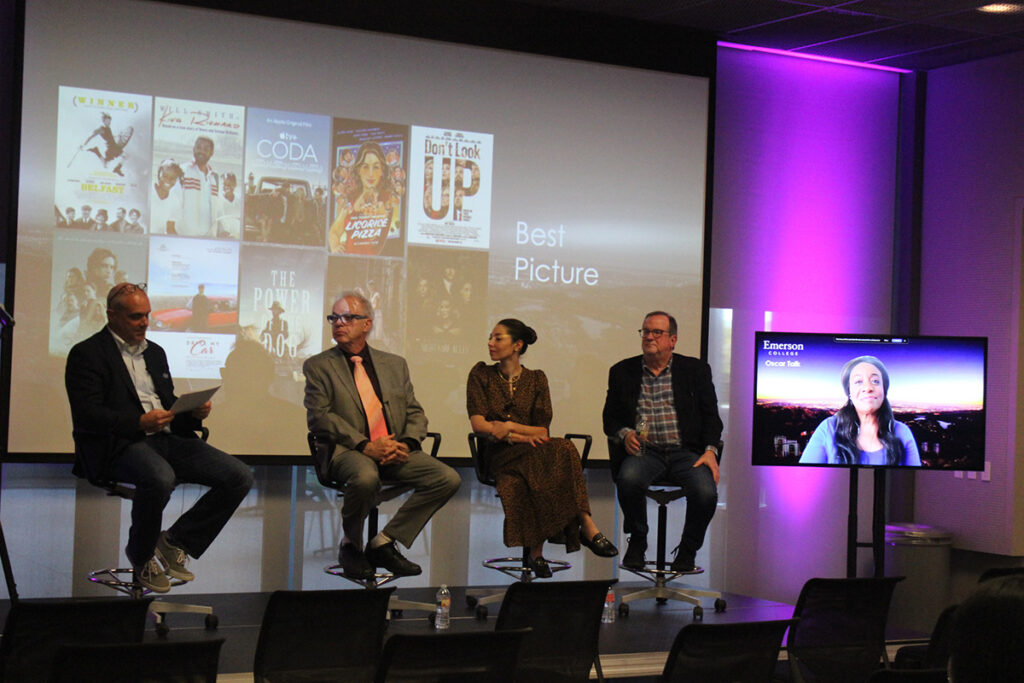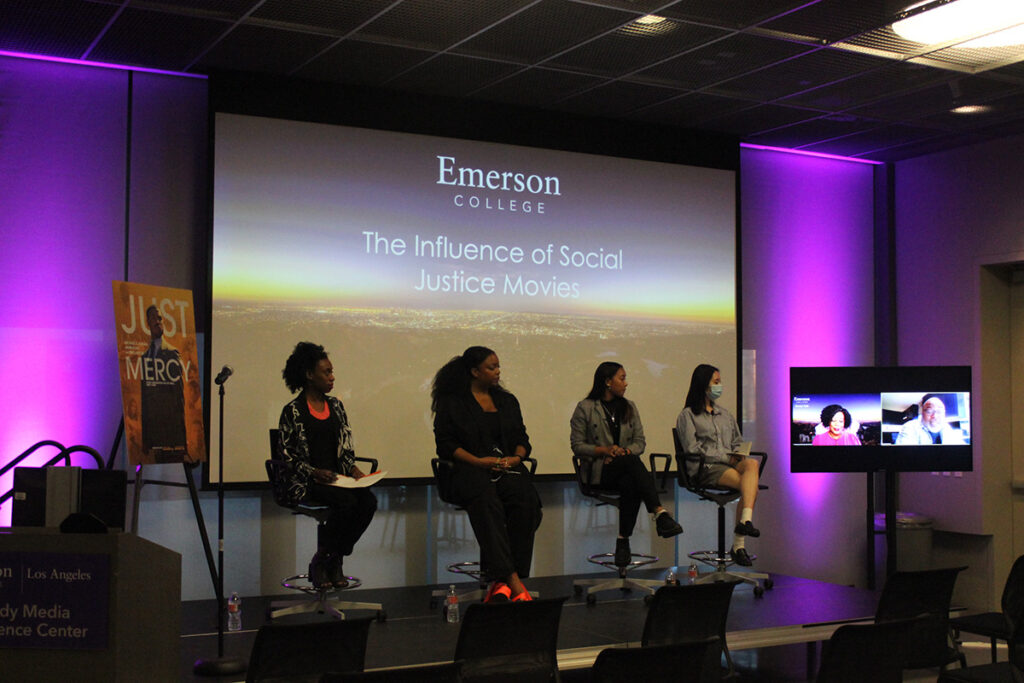Hybrid Oscar Talk Delves into Social Justice Films

The seventh annual Oscar Talk, held for the first time as a hybrid in-person and virtual event, brought together entertainment journalists, film critics, filmmakers, students, and alumni, among others, to Emerson College Los Angeles on March 24, to talk about the Academy Awards and social justice in films and documentaries .
“This year, with the help of an extremely talented IT team in LA, including several students, we continued to see the evolution of Oscar Talk as a hybrid event,” said Owen Eagan, a senior lecturer in the Department of Communication Studies. “This format allows us to reach a broader audience to discuss communication trends in the industry and, more importantly, to raise awareness of important issues and to advocate for change.”
The event, which allows members of the public to hear from entertainment experts on communication issues that influence the Oscars and shape the industry, is organized by the Emerson’s Department of Communication Studies each year.
The evening kicked off with a panel on Oscar Buzz followed by another on the Influence of Social Justice Movies.
Actress Trinitee Stokes ’25 introduced the first panel. Panelists were: Tim Gray, awards editor and senior vice president of Variety; Dana Bseiso, vice president at the Angellotti Company; Pete Hammond, chief film critic and awards columnist for Deadline Hollywood; and KJ Matthews, a veteran, award-winning entertainment journalist and a new member of the Hollywood Foreign Press Association, who joined virtually. Eagan moderated the panel.
Panelists shared their thoughts on a number of the Oscar races, as well as the large influence that pundits had on this year’s awards season due to the impact of the pandemic.

The second panel focused on the influence of social justice movies. Panelists were: Rachel Hislop, a writer, editor, strategist, and public speaker; Caelynn Marie Timbreza ’22 and Cecile Yang ’22, seniors at Emerson College; Carla Renata, known as The Curvy Film Critic, who joined virtually; and Gil L. Robertson IV, co-founder and president of the African American Film Critics Association (AAFCA), who joined virtually. Sharifa Simon-Roberts, an assistant professor in the Department of Communication Studies, moderated the panel.
Diverse representation, the impact social justice movies have on viewers, and ways to decompress after watching traumatic experiences on film were just a few topics discussed during the panel.
Hislop shared how we as viewers have an important role to play when it comes to digesting media, especially documentary films.
“It is our personal responsibility…to make sure we are responsible about what we are consuming as truth,” said Hislop.
Timbreza pointed out that many films only recognize the trauma and struggles of disadvantaged communities rather than providing meaningful solutions or positive steps forward.
“There is that want, that desire, that hunger, for something that’s more than just watching constant movies and content that only show the cases of struggles or marginalized communities,” said Timbreza.
There was a discussion revealing the role the film industry plays in influencing our world through awards and acknowledgment.
“Oftentimes, films that revolve around social issues or social justice certainly are not critically acclaimed, which means they’re [not likely] to be on the shortlist for awards like the Academy Awards,” said Robertson. “Those films can often find audiences or have the influence to create movements that can bring about some real significant change in the real world.”
Yang chimed in about the importance of intention when it comes to people supporting social justice movies and causes.
“We don’t know whether they support [the] work,” said Yang, as panelists discussed virtue signaling and the prevalence of it on social media. “[It may not be] the intention of their actions.”
When it comes to authenticity in storytelling, one of the questions raised by the audience was whether it’s more important to tell a story or have the right person tell it.
“It is important to have the film made,” said Renata, who used the film Malcolm X as an example. The movie was originally going to be directed by Canadian film director Norman Jewison, sparking criticism, until he bowed out and Spike Lee took the reins. “It is also extremely important who is making that film.”
At the end of the evening, Simon-Roberts asked each panelist to recommend social justice movies for the audience to watch. The suggested films included: 13th, Just Mercy, Let It Fall: Los Angeles 1982–1992, I Am Not Your Negro, and A Time to Kill.
“The panel, consisting of industry experts and students, offered rich, diverse perspectives on the power of social justice movies,” said Simon-Roberts, who shared some of her and Eagan’s ongoing research on the influence of social justice movies during the event. “The stimulating discussion left us with much to consider as we continue to consume media.”
Categories